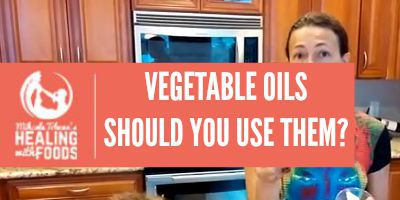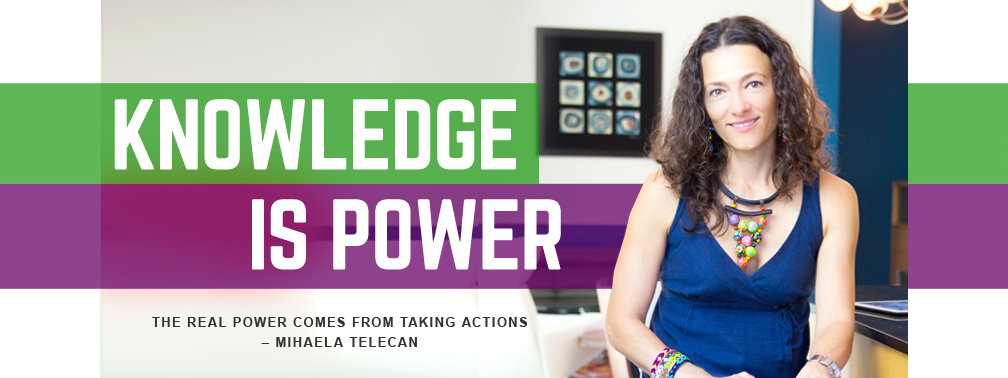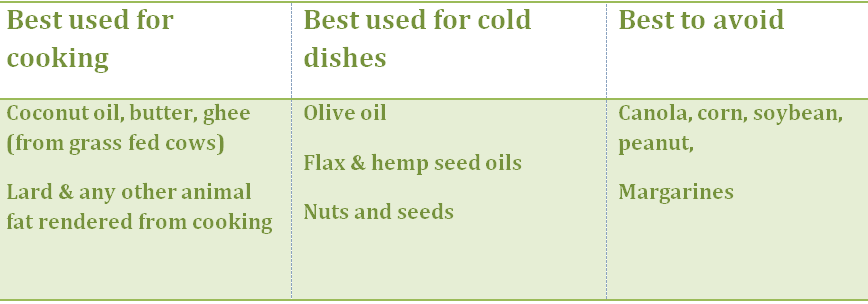hi

Vegetable Oils Are They Good For You? {part two}
As I promised on my last blog today I will give you the scoop on vegetable oils. After you read this please let me know if you think you need an oil change.
OK, so let’s take a look at the unsaturated fatty acids. Those are of two kinds: poly and monounsaturated, also known as PUFA & MUFA.
I should perhaps first clarify what makes a fat saturated (oh no…chemistry lesson). Saturation is determined by the amount of hydrogens that are feeding into the carbon atoms of the fatty acid chain. The more hydrogen the more saturated the fat is, and the more stable, the less hydrogen the more unsaturated the fat is and the more unstable when exposed to oxygen, light and temperature).
Poly-unsaturated fats (PUFA) lack many hydrogen atoms which make them very unstable and easily get denatured by oxygen, heat, and light.
In nature we find FUFAs in animal as well as plan foods.
Vegetable sources of PUFAs:
- Vegetable oils such as canola, corn, soybean oil, peanut, etc.
- Seeds oils such as flax, hemp, chia seeds, sunflower, and safflower seed oils, etc.
- All nuts and seeds contain PUFAs
Those are your main sources of the essential fatty acids omega-6 (linoleic acid) and omega-3 (alpha-linolenic acid). They are considered essential because we can’t manufacture them, hence we must get them from the foods we eat.
Animal sources of FUFAs:
- The marine fats coming from the cold water fish such as sardines, mackerel, herring, anchovy, salmon, and trout are also PUFA and they provide us with the EPA (eicosapentaenoic acid) and DHA (docosahexaenoic acid). EPA & DHA are also produced in our body from the plant sources of omega-3 (e.g. flax oil, or hemp oil). The conversion rate of the omega-3 fats into DHA & EPA however, is very low, so it’s best if one acquires the DHA & EPA from the sources mentioned above or in a form of high quality fish oil supplement.
How do you recognize PUFAs?
- They are liquid at room temperature and liquid in the refrigerator as well as freezer
- A good hemp or flax seed oil will be sold in a dark bottle in the refrigerator section of a supermarket
Now knowing that those fats are highly affected by heat, oxygen and light and they degrade into highly toxic oxidation products when heated would you use them for cooking? I hope you answer NO!
I personally don’t use and don’t recommend using PUFA oils for cooking and when it comes to vegetable oils (e.g. canola, soybean, corn, peanut) I actually do not recommend using them at all, period.
Here is why.
- These oils are primarily poly-unsaturated fats, which means they are extremely sensitive to the action of heat, light and oxygen, they get oxidized, become damaged contributing to the inflammatory processes in the body.
- They are high in omega-6 fats (the inflammatory fats). A good ratio of the omega-6 to omega-3 fats (the anti-inflammatory fats) is 1:1 or 2:1. Our modern diets today supply us with a ratio of 15:1 or as high as 30:1 inflammatory omega-6 to anti-inflammatory omega -3 fats. How is that possible? This is the direct result of increased consumption of vegetable oils. Remember we’re living in the processed food era. Take a look at the ingredients in any packaged food you buy (potato chips, tortilla chips, pita chips, crackers, cookies, etc.) you’ll always find one of these ingredients: canola oil, sunflower oil or soybean oil, etc. and the things get even more complicated if those fats are hydrogenated or partially hydrogenated which brings up the issue of the trans fats. Today I won’t get into the trans-fats, we can leave that for another time.
- They’re also highly refined “food like substances”. Eating seeds and nuts in their raw un-altered form, we only extract a minute amount of these oils. It is only through extensive industrial processing that we are exposed to high levels of these fats. There are numerous scientific studies that show a correlation between the consumption of these oils and the incidence of cancer, heart disease, diabetes, and other inflammatory related conditions.
What about canola oil? Isn’t that healthy? My favorite question of all.
Canola oil is a rich source of the omega-3 anti-inflammatory fats. So you might assume canola oil is good for you. Let’s see is it?
This is why I do not recommend it.
- Canola oil is extracted from a rape seed/plant that’s been modified by Canadian geneticists to make it non-toxic. The original rape seed has a high euric acid content. Euric acid is toxic to humans and animals (in rats it causes fatty degeneration of the hearth, kidney, adrenals and thyroid). The Canadian scientists through hybridization methods created a rape seed plant with low euric acid content which allows the extraction of the canola oil.
- The bottom line is: canola oil you find today in the supermarket is extracted from a plant that didn’t even exist in nature it’s a man-made product from start to finish. A “food like substance”.
Last but not least, mono-unsaturated fats or MUFA.
They have more hydrogen atoms than the PUFAs but less than the saturated fats. Hence they are a bit more stable that the PUFAs and less stable than the saturated fats, they fall somewhere I the middle. These fats are not as sensitive to heat, light and oxygen exposure, as the poly-fats are, however sensitive enough to suffer damage and denaturation while heated.
Food sources of MUFAs:
- Olive oil is a mono-unsaturated fat also known as omega -9 or oleic acid rich oil. Other plants that are good source of the oleic acid are almond, avocado, pecan, cashew, filbert and macadamia nuts.
How do you recognize mono-fats?
- They are liquid at room temperature and become cloudy when refrigerated (fun fact-when you refrigerate olive oil it gets a bit ticker and forms white clouds).
- A good olive oil will be sold in a dark glass bottle
My recommendation is to use those fats on cold meals (salads, in shakes) or low heat dishes such as on steamed vegetables. Store them in dark bottles away from direct light and heat exposure.
I like to say if you pay extra for a first cold press extra virgin olive oil, just keep it that way:)
At a glance
This article was also published in The Elephant Journal.




